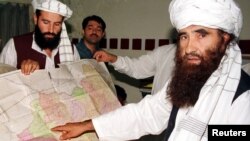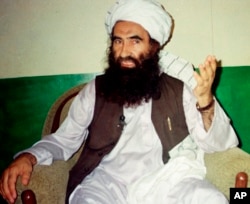The man who founded the Haqqani network, one of the most feared and deadly arms of the Afghan Taliban, has died after a long illness.
Taliban spokesman Zabiullah Mujahid Tuesday released a statement confirming the death of Jalaluddin Haqqani and paying tribute to his “Jihadi struggle” and offering condolences to his “Jihad loving family.”
Haqqani joined the Afghan jihad against the former Soviet Union in the 1980s.
“A time when our nation faced the dangers of atheist communism and the Islamic land of Afghanistan was under the threat of irreligiosity ... his excellency Haqqani Sahib and other honorable Mujahideen of that era took a stand against communist heresy,” the Taliban statement said.
At the time, he was also close to the Central Intelligence Agency, which was supporting the fighters against the former USSR.
After the Taliban took power in the 1990s, Haqqani joined them as their Minister of Frontiers and became a member of their Leadership Council.
When the Taliban were ousted from power by a United States-led attack in 2001, he fled to neighboring Pakistan.
His group, the Haqqani network, has carried out some of the most complicated, precise, and deadly attacks in Afghanistan. Afghan and Western officials believe a truck bomb in Kabul in 2017 that killed more than 150 people and damaged the German embassy, was a work of this network.
The group is now headed by his son Sirajuddin Haqqani, who is the No. 2 man in the Afghan Taliban leadership after their Amir, Mawlawi Hibatullah Akhundzada. However, he is widely believed to be the one leading the military efforts against the NATO and Afghan forces.
Taliban spokesman, Zabihullah Mujahid, told VOA that Haqqani died in Afghanistan and was buried there. He declined to name the place or say exactly when the burial took place.
Insurgent sources reported a few years ago that the aging Haqqani was injured in a U.S. air raid against his hideout near the Pakistan-Afghanistan border and succumbed to his injuries later. But the Taliban had at the time refuted those reports.
VOA's Ayaz Gul contributed to this report.












